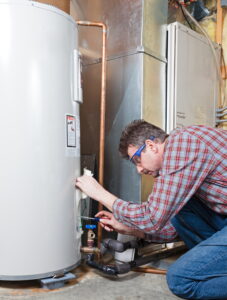If you’ve had your water heater for a while, you may be wondering when it will be time to invest in a replacement. Water heaters can last for anywhere between 10-15 years, depending on whether they are gas or electric and how well they are cared for.
But eventually, you do have to replace them. Whether you have an electric or gas water heater in Smithsburg, MD, our team can help you with upgrading to a new model. The question is, how do you know when it’s time to get rid of your old water heater? You can keep reading to learn more about the top five signs that indicate it’s time for a new water heater.
Water Heater Leaks
Water heater leaks should be a major red flag that something is wrong with the unit. It’s easy to think that since the water heater is a water appliance, leaks are going to happen from time to time. But this is not the case.
Water heaters need to be completely airtight for efficient operation. If too much oxygen is able to get into the tank, it can lead to corrosion. Once rust begins to develop inside of a water heater, the tank needs to be completely replaced because rust cannot be reversed and will only continue to worsen with time.
Discolored Water
If you turn the water on at any tap in your home, it should run clear. If the hot and cold water are both discolored, you may have a larger problem. But if discoloration is limited to turning on hot water, that’s a sign that corrosion has already developed inside of your tank. The developing rust is tinting the water inside of the tank an orange or brownish color.
Unusual Sounds
Rumbling or popping noises can be a sign of mineral buildup caused by hard water. These minerals may not be visible to the naked eye, but over time they can form a sediment that settles on the bottom of your water heater. When heating elements turn on, the sediment reacts to create a popping or rumbling noise.
This sediment can be very abrasive and wear down the lining inside of your water heater, exposing the metal so that it corrodes more easily. If you identify sediment buildup early, you can have your water heater flushed regularly to prevent build-up from getting to be too much.
Inconsistent Temperatures
Your water heater should be able to produce steady heat. Of course, when you first turn on the hot water it may take a few minutes to warm up. But once it does, the heat should be consistent unless you are adjusting the faucet.
Sudden spurts of very hot or very cold water as a red flag that something is wrong with your water heater. Sometimes the problem can be fixed, but other times you need to replace your unit with a newer model.
Water Heater Age
Gas water heaters have a slightly shorter expected lifespan of between 8-12 years. An electric water heater can last for closer to 10-15 years before needing to be replaced. Of course, you’ll want to keep in mind that care for your water heater does play a role in how long it will last.
Once your water heater reaches the 10-year mark, there’s a good chance that it will need to be replaced sooner rather than later. Scheduling annual maintenance is the best way to take excellent care of your water heater and also when it is reaching the end of its lifespan.
To schedule your water heater service, contact Premier HVAC Services today! Our team of experts is ready to answer your questions and help with all of your water heater needs.


